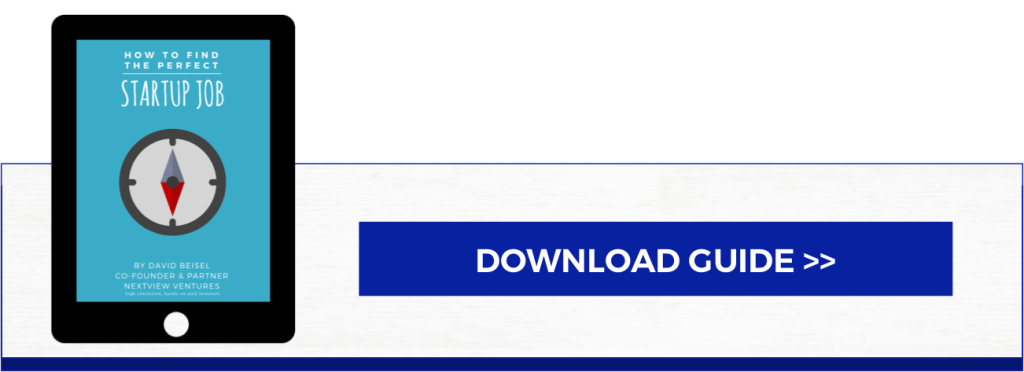David Beisel’s Perspective on Digital Change
How to Find the Perfect Startup Job: Part II “Sifting Through a Sea of Companies”
Note: We’ve taken this entire series, added more content to it, and turned it into a visual playbook for finding the perfect startup job. Get your copy here (triggers PDF download)
Once you’ve figured out whether you want to find a very early stage startup or a late stage one (the topic of my first post in this series), the real hard work begins. There’s a sea of information, both in the blogosphere and residing in the heads of everyone your informal network, which an individual job-seeker needs to wade through to find strong startup and the right role in it.
My advice: search for heat, but don’t follow – evaluate. Whether it’s early or late, there are always a certain set of startups within a particular ecosystem that are generating all of the talk in the community. On the early side, it’s repeat founders coming together again or early runaway traction in an early beta that generates buzz. For later-stage, it’s a high-priced financing round, tipping scales on widespread adoption, rapid hiring, or credible information on successive revenue-growth quarters. But remember, heat is often a good indicator of an attractive startup, but it’s neither a necessary nor a sufficient condition to finding the right startup to join.
Think of heat as a sign outside the restaurant, but not the menu. You’re looking for the right dish. (My next post in this series will explore selecting the right startup). Yet it’s important to look for heat as part of a process in systematically identifying a potential set of startups from which to select. Heat is a guidepost which will lead your journey, but remember to pay attention to those interesting stops along the way without all of the glittering lights.
The right approach is to think broadly but network and search to ask specifically. You want to cover as broad ground as possible, but be very targeted when talking to people within the startup ecosystem or utilizing resources in it.
DOs for a systematic rather than haphazard startup job search:
- Pick a specific vertical or theme (e.g. mass-customization ecommerce, mobile-local platforms, technology-enabled education), identify all of the startups within your geography, and network to anyone within the company to find out their hiring pace. If it sounds like they’re hiring generally, then is the time to be intentional about who you talk to in the company. At first, you’re just looking for early indications of success.
- Ask startup service providers (lawyers, accountants, commercial bankers, consultants) which one of their clients is getting the most traction this year. People plugged into the know can of course potentially connect to many startups, but the more specific request the better. Then you should ask additional very specific questions: which is their favorite startup with a SaaS sales model, or which has the most experienced CEO, or which has the best investor at board meetings? Specific questions spur new ideas. General inquiries get lost in the shuffle.
- Look back at all of the companies which have announced financings (in your geography and target stage) with new outside investors in the past quarter. They’re hiring by definition because they just raised capital.
- Look for specific roles in specific outlets for general opportunity. For example here locally in Boston, dedicated startup job boards are actually fairly fruitful: VentureFizz, Greenhorn Connect, and Web Innovators Group. If these companies are actively posting positions, there are good things happening at the startup. Even if the role posted isn’t a fit for your skillset, you’ve still identified companies where there’s hiring broadly, so there may be a role for you.
DON’Ts:
- Don’t ask a venture capitalist “are there any job openings in your portfolio?” It’s too generic and won’t right any bells. Ask a VC which company in their portfolio is hiring the most people right now and are there openings which fit?
- Don’t waste too much time looking through VC’s endless portfolio pages. The good are interspersed with the bad and the ugly.
- Don’t tell people you’re a great business guy looking for a technical team with an idea/product which needs business acumen – this general search rarely culminates in anything. Usually a strong team of that profile knows they have specific skillsets missing and are looking to fill those with (a) functional specialist(s) rather than a swiss-army-knife individual. Or the team is weak and really needs a jack-of-all-trades business type, but isn’t self-aware that they need the help.
Within a short period of time of following a systematic approach to identifying companies with heat (and perhaps a few which don’t but sound promising nonethless), you should have a list of a half-dozen or dozen which have good potential. Next, find your way to get introduced to someone at those startups. LinkedIn is the best online tool to explore your network, but you can also accomplish this in person by going to tech networking events and asking around for introductions. Of course, finding a more senior level person at the company is better, but given the (hopefully) ever-growing pace of a hot startup, usually nearly all employees can put you on their hiring evaluation path because they frequently have implemented a specific process for it.
At the end of the day, you’re joining a startup because of the excitement and upside that comes along with it more than just being another job. So systematically making a list with some of the strategies above shouldn’t be a chore, but rather a fulfilling exploration of what’s out there. Learning about new companies, new projects, new technologies, new roles should interest you — or perhaps a startup gig isn’t for you. The tough part is the next topic in this series: narrowing it down to the right venture.
Download the complete guide below:

